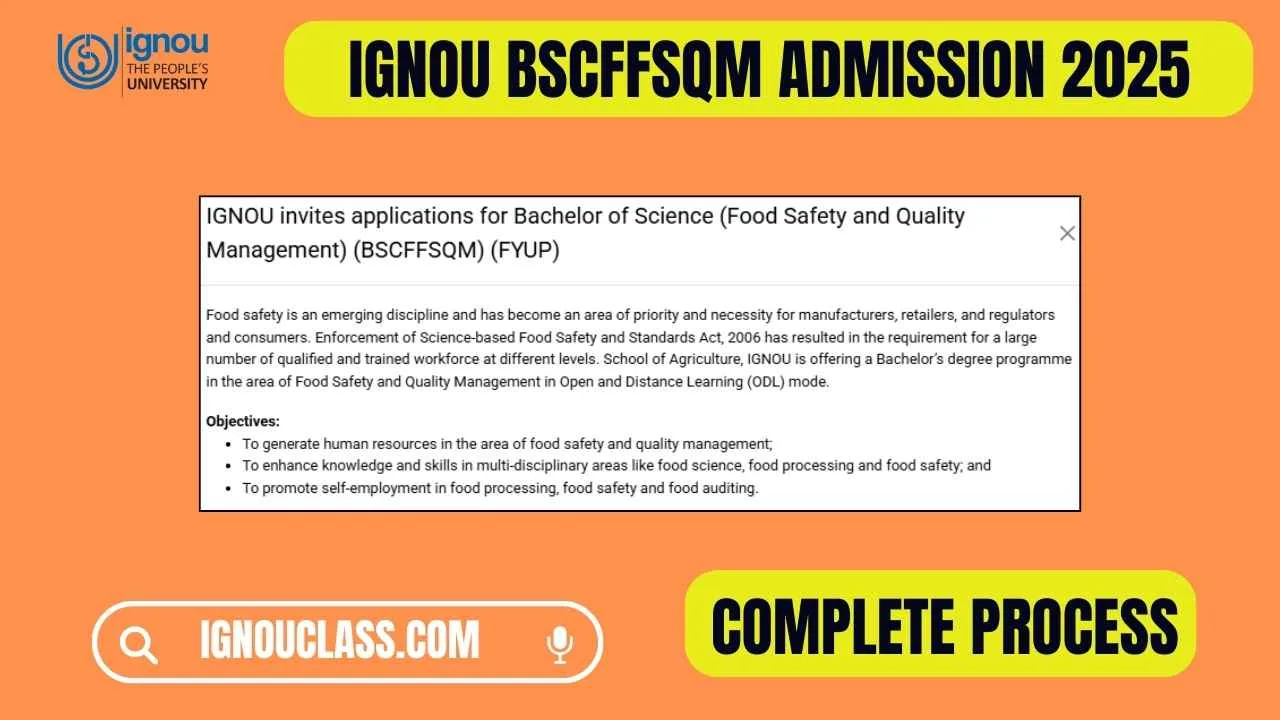Food safety and quality are critical pillars of the food industry. As the world becomes more interconnected and complex, the importance of trained professionals in food safety and quality management is growing. To meet this demand, the Indira Gandhi National Open University (IGNOU) has launched a cutting-edge Bachelor of Science in Food Safety & Quality Management (BSCFFSQM). This is a comprehensive program designed to provide a multi-disciplinary education in food safety, food quality control, and food science.
In this article, we’ll explore everything you need to know about the BSc in Food Safety & Quality Management offered by IGNOU, from program details and eligibility to career opportunities and more.
Introduction: The Growing Importance of Food Safety and Quality Management
In an age where foodborne diseases, contamination, and food quality issues are widespread concerns, ensuring food safety and quality is more important than ever. Whether you are a consumer, manufacturer, retailer, or regulator, food-safety is essential for public health, business sustainability, and consumer trust.
Food-safety and quality management professionals play a vital role in preventing contamination, improving food processing practices, and ensuring adherence to stringent regulations. According to reports, the global food safety market is projected to grow significantly, opening up lucrative career opportunities for skilled professionals.
The BSc in Food Safety & Quality Management offered by IGNOU aims to fill this gap by equipping students with the necessary knowledge, skills, and certifications to become leaders in this growing field.
What is Food Safety and Quality Management?
Food-safety and quality management encompass practices that ensure food products are safe, of high quality, and comply with regulatory standards. This discipline involves managing the processes of food production, processing, storage, and distribution to prevent contamination, ensure hygiene, and maintain product integrity. It is crucial not only for public health but also for business competitiveness in the global market.
Key aspects of food safety and quality management include:
- Food-Safety Standards: Regulations to ensure food is free from harmful contaminants.
- Food Quality Control: Monitoring and improving the taste, appearance, texture, and nutritional value of food products.
- Risk Management: Identifying, assessing, and mitigating risks that may impact food safety and quality.
About IGNOU: A Leading Educational Institution
Founded in 1985, IGNOU has grown to become one of the largest and most recognized distance education universities in India. With a reputation for providing accessible, affordable, and flexible learning opportunities, IGNOU offers a variety of undergraduate, postgraduate, and diploma courses to students from all walks of life.
IGNOU’s commitment to quality education is reflected in its diverse offerings, which cater to emerging industries and evolving market needs. The university’s Open and Distance Learning (ODL) mode allows students to pursue their degrees from anywhere in the world, making higher education more accessible than ever before.
Program Overview: BSc in Food Safety & Quality Management (BSCFFSQM)
The BSc in Food-Safety & Quality Management is a forward-thinking program designed to equip students with the knowledge and skills needed to work in the food industry, government regulatory bodies, or as independent consultants. This bachelor’s degree is offered under the Open and Distance Learning (ODL) mode, providing maximum flexibility for students.
Program Highlights:
- Comprehensive Curriculum: The program covers food science, food processing, food quality assurance, food safety standards, and regulations.
- First-of-its-Kind Offering: This program is one of the first bachelor’s degrees in India to focus on food safety and quality management, making it a unique opportunity for aspiring professionals.
- Industry-Relevant: Developed in alignment with the National Education Policy (NEP) and UGC’s FYUP (Four-Year Undergraduate Program) guidelines, ensuring that the curriculum meets industry needs.
Program Duration, Flexibility, and Learning Mode
One of the unique features of IGNOU’s BSc in Food Safety & Quality Management is its flexibility. The program can be completed within a minimum of 3 years and a maximum of 6 years, depending on the student’s pace and availability.
Open and Distance Learning (ODL) Mode
- This learning mode allows students to balance studies with their professional or personal commitments.
- IGNOU offers a blended learning approach, combining online resources, recorded lectures, printed study materials, and face-to-face interactions (optional).
The flexibility of the program makes it ideal for working professionals, stay-at-home parents, or anyone looking to further their education while managing other responsibilities. 📚
Eligibility Criteria: Who Can Apply for the Program?
To apply for the BSc in Food-Safety & Quality Management, candidates must meet the following eligibility criteria:
Required Qualifications:
- Completion of 10+2 (higher secondary school) education with a focus on Science or Agriculture.
- Candidates with an equivalent qualification from a recognized board or institution are also eligible to apply.
Additional Considerations:
- There is no age limit for this program, making it accessible to individuals at various stages of their careers.
For those who meet the eligibility requirements, applying to the program is a straightforward process.
Program Objectives: What Will You Learn?
The BSc in Food-Safety & Quality Management program is designed with a clear set of objectives aimed at providing students with specialized knowledge and practical skills in food safety and quality assurance.
Key Learning Outcomes:
- Human Resource Development: The program aims to develop skilled professionals who can meet the growing demand in the food industry.
- Multi-Disciplinary Knowledge: Students will gain expertise in food science, food processing, food safety standards, and more.
- Skill Enhancement: Focused on building skills in auditing, regulatory compliance, and quality control.
- Promote Self-Employment: Students are encouraged to become entrepreneurs or consultants in food safety and quality management.
Through this comprehensive education, graduates will be prepared to handle the challenges of ensuring food safety at multiple levels of the food supply chain.
Core Modules and Subjects in the BSc Program
The program consists of core modules that provide a deep dive into the various aspects of food safety and quality management. Below are some of the key subjects covered:
Core Modules:
- Food Science and Technology: Introduction to the properties, composition, and nutritional value of food.
- Food Safety Standards and Regulations: Study of national and international food safety laws and standards.
- Food Quality Control: Techniques for monitoring and controlling the quality of food products.
- Food Processing and Preservation: Methods for preserving food and ensuring safety during processing.
- Food Safety Auditing: Learn how to assess food safety systems and ensure compliance with regulations.
These modules provide both theoretical knowledge and practical applications, ensuring students are ready for the demands of the food safety sector. 🍏
Multiple Entry and Multiple Exit Options: Flexibility for Students
One of the standout features of the BSc in Food-Safety & Quality Management is the provision for Multiple Entry and Exit Options. This innovative approach offers students the flexibility to exit the program with a certificate or diploma after completing certain stages, or continue toward the full bachelor’s degree.
How It Works:
- Entry Options: Students can enter the program at different levels depending on their academic background and work experience.
- Exit Options: After completing the first year, students can opt for a Diploma in Food Safety & Quality Management. Upon completing the second year, they can exit with a Higher Diploma or continue to complete the full BSc.
This structure gives students the freedom to decide the level of education they want to pursue based on their career goals. 🎓
Practical Training and Industry Exposure
A crucial aspect of the BSc in Food Safety & Quality Management is the emphasis on practical training and industry exposure. This ensures that students gain hands-on experience in real-world scenarios.
Internships and Industry Partnerships:
- Students will be encouraged to undertake internships with food processing units, regulatory bodies, or quality control organizations.
- IGNOU has partnerships with leading food safety and food processing industries to provide students with valuable industry exposure.
By combining theoretical knowledge with practical experience, students will be equipped to tackle the challenges in food safety and quality management. 🔍
Career Opportunities after Completing BSc in Food Safety & Quality Management
The demand for professionals skilled in food-safety and quality management is on the rise globally. With increased awareness of foodborne diseases, contamination risks, and the need for compliance with food safety regulations, the food industry is actively seeking qualified individuals who can help ensure the safety and quality of food products.
Career Paths for Graduates:
Graduates of the BSc in Food Safety & Quality Management program have diverse career opportunities across a wide range of industries. Here are some potential job roles you can pursue:
- Food Safety Officer: Working with regulatory bodies, food safety departments, and certification agencies to ensure compliance with food safety laws and regulations.
- Food Quality Control Manager: Overseeing quality control processes in food production facilities to ensure that products meet both safety and quality standards.
- Food Safety Auditor: Conducting audits for food businesses to ensure that they are complying with local and international food safety standards.
- Technical Officer in Quality Control: Managing and implementing quality assurance processes in food processing companies to maintain high standards.
- Trainer/Counselor: Training employees in food safety procedures and guiding food industry professionals on best practices.
- Consultant or Entrepreneur: Offering expert advice on food safety and quality management or starting your own consultancy firm.
Graduates can also find job opportunities in hospitality institutions, retail chains, and supply chain management roles. With the rise in demand for certified food safety professionals, this field is set to continue expanding. 🌍
Employment Sectors for Graduates of BSc in Food Safety & Quality Management
Graduates of this program will be well-equipped to work across a variety of sectors, which include:
1. Food Manufacturing and Processing
Food manufacturers and processors need trained professionals to maintain product quality and ensure compliance with safety standards. Graduates can work as food-safety officers, quality control managers, or process safety experts.
2. Regulatory Agencies and Government Bodies
Government organizations like the Food-Safety and Standards Authority of India (FSSAI) and other regulatory bodies across the world require qualified personnel to implement and enforce food safety laws and regulations. Graduates can work as inspectors or food safety auditors in these organizations.
3. Retail and Supply Chain Management
The retail sector requires professionals to ensure that food products are handled safely and comply with all regulations during distribution and sale. Graduates can work as supply chain management team members or quality auditors in the retail and wholesale sectors.
4. Certification and Inspection Bodies
Graduates can work in certification agencies that provide food safety audits and certifications to food companies. This can include roles like food safety auditors, where professionals assess the food-safety systems of different food businesses to ensure they meet international standards.
5. Consultancy and Training
With expertise in food safety and quality management, graduates can start their own consultancy services, offering guidance to food businesses or government agencies. Additionally, food safety professionals can work as trainers or counselors, educating others on food safety standards, regulations, and best practices.
By diversifying across these sectors, food-safety professionals can build long-lasting and impactful careers that contribute to public health and industry development. 🌱
Entrepreneurial Opportunities for Graduates
In addition to working in established organizations, graduates of the BSc in Food-Safety & Quality Management program can also venture into self-employment and entrepreneurship. Here are some potential entrepreneurial opportunities:
1. Food Safety Consultancy
Food processing companies, restaurants, and other food-related businesses are always on the lookout for experts who can guide them on best practices for food safety. As a consultant, you can help businesses create safety protocols, conduct audits, and ensure compliance with food-safety regulations.
2. Food Safety Training and Certification
Starting your own food-safety training center can be a profitable venture. Many food businesses need to train their employees on food safety practices. Offering certifications and training programs can generate a steady stream of income while providing valuable services to the food industry.
3. Food Safety Auditing Services
As food safety becomes more critical, many businesses need certified food-safety auditors to assess their operations. By establishing your own auditing firm, you can cater to the growing demand for food safety assessments and compliance audits.
Graduates with entrepreneurial aspirations can leverage their degree to create their own business in food safety, thereby contributing to the industry’s development and growth. 💼
IGNOU’s Support and Resources for Students
IGNOU is known for providing comprehensive support to its distance learners. Here’s how the university ensures that students succeed in their BSc in Food Safety & Quality Management program:
1. Learning Materials
IGNOU provides students with printed study materials for all courses, which are carefully curated by academic experts. The materials are designed to help students understand the complex concepts of food safety, quality management, and food processing.
2. Online Resources and Webinars
In addition to printed materials, IGNOU offers online resources, including videos, webinars, and interactive sessions, to further enhance students’ understanding of the subject matter. This blended learning approach allows students to access learning materials anytime, anywhere.
3. Faculty Support
Students have access to highly qualified faculty members who provide academic guidance and answer any queries through online discussions, telephonic support, or email.
4. Alumni and Industry Networking
IGNOU encourages students to network with alumni and industry professionals through workshops, seminars, and guest lectures. These interactions can lead to valuable connections and career opportunities in the food safety industry.
By providing extensive support, IGNOU ensures that students have everything they need to succeed, even in a distance learning environment.
How to Apply: Admission Process for the BSc Program
Applying to the BSc in Food-Safety & Quality Management program is simple and straightforward. Follow these steps to begin your journey toward becoming a food safety professional:
1. Visit the IGNOU Admission Portal
Go to the official IGNOU admission website at https://ignouadmission.samarth.edu.in/ to start your application.
2. Fill Out the Application Form
Complete the application form with your personal details, academic qualifications, and other necessary information.
3. Submit Required Documents
You’ll need to upload scanned copies of the following documents:
- Marksheet and certificate of 10+2 or equivalent.
- Identity proof (Aadhar Card, Passport, etc.).
- Passport-sized photograph.
4. Pay the Application Fee
Once your form is complete, make the payment for the application fee via the available online payment methods.
5. Wait for Confirmation
After submitting your application, you will receive a confirmation email or message regarding your admission status.
Unique Features of the Program: Why Choose IGNOU’s BSc in Food Safety & Quality Management?
The BSc in Food-Safety & Quality Management program at IGNOU offers several advantages that set it apart from other educational options:
1. First-of-its-Kind Program
This program is one of the first in India to offer specialized education in food safety and quality management through the Open and Distance Learning mode. It combines the convenience of online learning with the rigors of academic excellence.
2. Flexible Learning and Multiple Entry/Exit Options
IGNOU’s ODL model gives students the flexibility to learn at their own pace. The program also offers multiple entry and exit options, allowing students to earn a certificate, diploma, or full degree based on their academic progress.
3. Industry-Relevant Curriculum
The curriculum is developed in line with national and international standards, ensuring students are equipped with the knowledge and skills that are in demand by employers.
Challenges and Rewards of Pursuing the BSc in Food Safety & Quality Management
Like any educational program, pursuing a degree in Food-Safety & Quality Management comes with its challenges. However, the rewards far outweigh the obstacles.
Challenges:
- Time Management: As an ODL program, students must manage their time effectively to balance studies with other commitments.
- Self-Discipline: Distance learning requires a high level of self-motivation and discipline to stay on track.
Rewards:
- Career Opportunities: Graduates of this program can enter a growing and dynamic industry with numerous career options.
- Flexible Learning: The ability to study at your own pace offers a level of convenience that traditional on-campus learning cannot match.
Conclusion: Is This Program Right for You?
If you’re passionate about food-safety and quality management, the BSc in Food Safety & Quality Management from IGNOU could be the ideal program for you. With a well-rounded curriculum, flexible learning options, and extensive career opportunities, this program is designed to set you up for success in the ever-expanding food industry.
By choosing this program, you will not only gain valuable knowledge and skills but also contribute to the ongoing improvement of food safety practices globally. 🌟
FAQs
What is the duration of the BSc in Food-Safety & Quality Management program at IGNOU?
The BSc in Food-Safety & Quality Management program at IGNOU has a minimum duration of 3 years and a maximum duration of 6 years. This flexible duration allows students to study at their own pace, making it ideal for those balancing work or other commitments.
What are the eligibility criteria for admission to the BSc in Food Safety & Quality Management program?
To be eligible for admission, candidates must have completed their 10+2 education with a background in Science or Agriculture or an equivalent qualification from a recognized board. There is no age limit for applying to this program, allowing students from various backgrounds to pursue this degree.
How is the BSc in Food Safety & Quality Management delivered at IGNOU?
The program is offered through Open and Distance Learning (ODL) mode, allowing students to access course materials online and offline. The program includes blended learning, with a mix of online resources, recorded lectures, printed study materials, and optional face-to-face interactions. This flexibility ensures that students can learn from anywhere, at any time.
What career opportunities can I explore after completing the BSc in Food Safety & Quality Management?
Graduates of the program can explore several career paths in the food industry, including:
Food Safety Officer and Quality Control Manager in food manufacturing and processing companies.
Food Safety Auditor for certification and inspection bodies.
Trainer/Counselor for food safety practices.
Consultant in food safety and quality management.
Supply Chain Manager in food retail and distribution.
There are also opportunities for self-employment or starting your own food safety consultancy or training business.
How do I apply for the BSc in Food Safety & Quality Management at IGNOU?
To apply, visit the official IGNOU admission portal at https://ignouadmission.samarth.edu.in/. Fill out the online application form, upload the required documents, and pay the application fee. Once your application is confirmed, you will receive further instructions on the admission process.
Related Posts:
- IGNOU PGDGI Admissions Open for 2025: How to Apply, Last Date, Best Guide
- IGNOU MBA Agribusiness Management Admissions Open for January 2025: Best Guide
- IGNOU M.Sc. Chemistry Admissions Open for January 2025: Apply Now!
- IGNOU Assignments: How to Choose the Right Sources 2025
- Mastering IGNOU Exam Paper Solving Techniques: A Comprehensive Guide 2025




